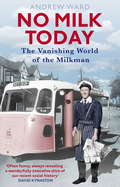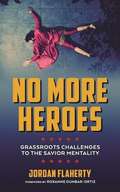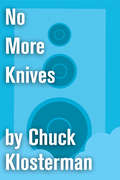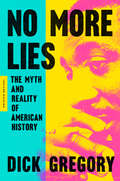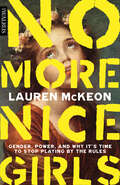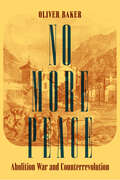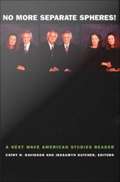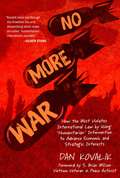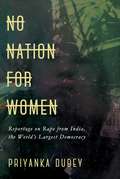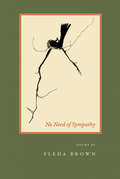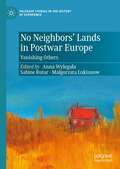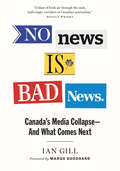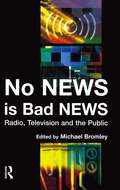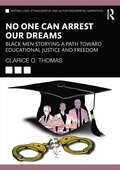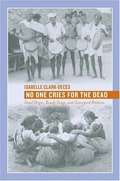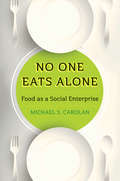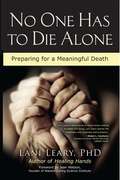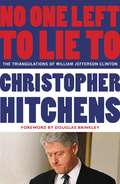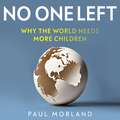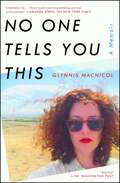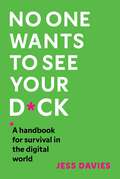- Table View
- List View
No Milk Today: The Vanishing World of the Milkman
by Andrew WardTraditionally, in British society, the milkman has been a family friend, a sex symbol and a cheerful chappie. He has been the eyes and ears of the community, and his genetic legacy has supposedly passed into the lineage of housewives.This collection of folk tales about milkmen covers the history of the job and the milkman's everyday experience. The book is structured by the milkman's working day. It starts with the alarm-clock and ends with the milkman returning home in search of sustenance and tender loving care. The book is less about changes in the dairy industry and more about the work experiences of the people who have delivered milk. Many milkmen are featured: Chris Frankland delivered over eight million pints before he retired at seventy-four; Alistair Maclean drove two million miles across the north coast of Scotland in fifty years; and Tony Fowler, an award-winning Leicestershire milkman, helped to put over fifty people in prison.For more than thirty years the author has collected milkman stories through oral testimony, newspaper archives, anecdotes, diaries, books and more formal interviews.
No Milk Today: The Vanishing World of the Milkman
by Andrew WardTraditionally, in British society, the milkman has been a family friend, a sex symbol and a cheerful chappie. He has been the eyes and ears of the community, and his genetic legacy has supposedly passed into the lineage of housewives.This collection of folk tales about milkmen covers the history of the job and the milkman's everyday experience. The book is structured by the milkman's working day. It starts with the alarm-clock and ends with the milkman returning home in search of sustenance and tender loving care. The book is less about changes in the dairy industry and more about the work experiences of the people who have delivered milk. Many milkmen are featured: Chris Frankland delivered over eight million pints before he retired at seventy-four; Alistair Maclean drove two million miles across the north coast of Scotland in fifty years; and Tony Fowler, an award-winning Leicestershire milkman, helped to put over fifty people in prison.For more than thirty years the author has collected milkman stories through oral testimony, newspaper archives, anecdotes, diaries, books and more formal interviews.
No More Heroes: Grassroots Challenges to the Savior Mentality
by Jordan FlahertyMissionaries of the left, saviors are people of privilege who believe they have all the answers. They want to help, but don't want to listen; they lead but never follow. From post-Katrina New Orleans, to anti-sex-traficking work, to do-gooder journalists, Flaherty's book reveals saviors' misdeeds but also shows how activists can build new, stronger movements.
No More Knives
by Chuck KlostermanOriginally collected in Chuck Klosterman IV and now available both as a stand-alone essay and in the ebook collection Chuck Klosterman on Pop, this essay is about Radiohead.
No More Lies: The Myth and Reality of American History
by Dick GregoryRepublished as part of Amistad’s Literary Revival Program, the groundbreaking, bestselling look at history from the perspective of African Americans: an essential classic that continues to speak to us today, written by the voice of black consciousness, Dick Gregory—the incomparable satirist, human rights and environmental activist, health advocate, social justice champion, and NAACP Image Award–winning author.In 1972, during the Black Power Movement, iconoclast Dick Gregory challenged one of the foundations of America itself—its history, which had been written almost exclusively from the white male perspective. In No More Lies, this true trailblazer gave voice to African Americans, speaking their truth about the past and race relations in the United States.No More Lies offers this incomparable satirist’s intellectual, conspiratorial, and humorous spin on the facts. No subject is off limits from his critical eye—Gregory examines numerous aspects of culture and history, from the slave trade, police brutality, the wretchedness of working-class life and labor unions to the 1968 Civil Rights Act, the Founding Fathers, “happy slaves,” and entrepreneurs. Although this absorbing book is more than forty years old, its provocative truths continue to reverberate in our lives today. With No More Lies, Gregory inspire a new generation to connect what is happening today with what has happened in the past.
No More Nice Girls: Countercultural Essays
by Ellen WillisWith characteristic intelligence, wit, and feminist insight, Ellen Willis addresses democracy as she sees it: &“a commitment to individual freedom and egalitarian self-government in every area of social, economic, and cultural life.&” Moving between scholarly and down-to-earth activist writing styles, Willis confronts the conservative backlash that has slowly eroded democratic ideals and advances of the 1960s as well as the internal debates that have frequently splintered the left.
No More Nice Girls: Gender, Power, and Why It’s Time to Stop Playing by the Rules
by Lauren McKeonA groundbreaking, insightful book about women and power from award-winning journalist Lauren McKeon, which shows how women are disrupting the standard (very male) vision of power, ditching convention, and building a more equitable world for everyone. In the age of girl bosses, Beyoncé, and Black Widow, we like to tell our little girls they can be anything they want when they grow up, except they’ll have to work twice as hard, be told to “play nice,” and face countless double standards that curb their personal, political, and economic power. Women today remain a surprisingly, depressingly long way from gender and racial equality. It’s worth asking: Why do we keep playing a game we were never meant to win?Award-winning journalist and author of F-Bomb: Dispatches from the War on Feminism, Lauren McKeon examines the many ways in which our institutions are designed to keep women and other marginalized genders at a disadvantage. In doing so, she reveals why we need more than parity, visible diversity, and lone female CEOs to change this power game. She talks to people doing power differently in a variety of sectors and uncovers new models of power. And as the toxic, divisive, and hyper-masculine style of leadership gains ground, she underscores why it’s time to stop playing by the rules of a rigged game.
No More Peace: Abolition War and Counterrevolution
by Oliver BakerRacial capitalism is and was not inevitable. At every point in US history, the exploited and dispossessed rebelled for an alternative future. In No More Peace, Oliver Baker highlights how numerous insurrections, revolts, and armed campaigns of enslaved and colonized people advanced abolition war as the movement to win collective life over class society in North America. From this aim, abolition war became the motor force for constant white counterrevolution. This puts America's history of class struggles in a revealing new light. Through historical analysis, literary critique, and theory, Baker shows how Black and Indigenous rebels developed insights about counterrevolution precisely through their militant confrontation with it. Unearthing these critical insights, Baker shows how US capitalism was reproduced and expanded through the long history of white counterrevolution. Whiteness and settler colonialism developed as anti-Black and anti-Indigenous alliances formed across class difference to organize people to police or soldier for capitalism. In No More Peace, we relive moments of radical abolition and anticolonialism—particularly those of Nat Turner, Harriet Tubman, John Brown, and the Seminoles—that also ruptured counterrevolution. Slavery and settler colonialism were always uncertain projects—vulnerable to defeat, collapse, and ruin by those who resisted. Racial capitalism was always contingent.
No More Separate Spheres!: A Next Wave American Studies Reader
by Cathy N. Davidson Jessamyn HatcherNo More Separate Spheres! challenges the limitations of thinking about American literature and culture within the narrow rubric of "male public" and "female private" spheres from the founders to the present. With provocative essays by an array of cutting-edge critics with diverse viewpoints, this collection examines the ways that the separate spheres binary has malingered unexamined in feminist criticism, American literary studies, and debates on the public sphere. It exemplifies new ways of analyzing gender, breaks through old paradigms, and offers a primer on feminist thinking for the twenty-first century. Using American literary studies as a way to talk about changing categories of analysis, these essays discuss the work of such major authors as Catharine Sedgwick, Herman Melville, Pauline E. Hopkins, Frederick Douglass, Catharine Beecher, Ralph Waldo Emerson, W. E. B. Du Bois, Sarah Orne Jewett, Nathaniel Hawthorne, María Ampara Ruiz de Burton, Ann Petry, Gwendolyn Brooks, Cynthia Kadohata, Chang Rae-Lee, and Samuel Delany. No More Separate Spheres! shows scholars and students different ways that gender can be approached and incorporated into literary interpretations. Feisty and provocative, it provides a forceful analysis of the limititations of any theory of gender that applies only to women, and urges suspicion of any argument that posits "woman" as a universal or uniform category. By bringing together essays from the influential special issue of American Literature of the same name, a number of classic essays, and several new pieces commissioned for this volume, No More Separate Spheres! will be an ideal teaching tool, providing a key supplementary text in the American literature classroom. Contributors. José F. Aranda, Lauren Berlant, Cathy N. Davidson, Judith Fetterley, Jessamyn Hatcher, Amy Kaplan, Dana D. Nelson, Christopher Newfield, You-me Park, Marjorie Pryse, Elizabeth Renker, Ryan Schneider, Melissa Solomon, Siobhan Somerville, Gayle Wald , Maurice Wallace
No More War: How the West Violates International Law by Using 'Humanitarian' Intervention to Advance Economic and Strategic Interests
by Dan Kovalik"Kovalik helps cut through the Orwellian lies and dissembling which make so-called 'humanitarian' intervention possible." —Oliver Stone War is the fount of all the worst human rights violations―including genocide―and not its cure. This undeniable truth, which the framers of the UN Charter understood so well, is lost in today&’s obsession with the oxymoron known as &“humanitarian" intervention.No More War: How the West Violates International Law by Using 'Humanitarian' Intervention to Advance Economic and Strategic Interests sets out to reclaim the original intent of the Charter founders to end the scourge of war on the heels of the devastation wrought by WWII. The book begins with a short history of the West&’s development as built upon the mass plunder of the Global South, genocide and slavery, and challenges the prevailing notion that the West is uniquely poised to enforce human rights through force. This book also goes through recent &“humanitarian" interventions carried out by the Western powers against poorer nations (e.g., in the DRC, Congo, and Iraq) and shows how these have only created greater human rights problems – including genocide – than they purported to stop or prevent.No More War reminds the reader of the key lessons of Nuremberg – that war is the primary scourge of the world, the root of all the evils which international law seeks to prevent and eradicate, and which must be prevented. The reader is then taken through the UN Charter and other human rights instruments and their emphasis on the prevention of aggressive war.
No Nation for Women: Ground Reportage on Rape from the World's Largest Democracy
by Priyanka DubeyNo Nation for Women takes a hard, close look at what makes India unsafe for its women — from custodial rapes and honour killings to rapes of minors and trafficking — the author uncovers many unpalatable truths behind what we are familiar with as newspaper headlines only... Numbers convey, in part, why India is referred to as one of the world’s rape capitals — one woman is raped every 15 minutes; and, in 50 years, there has been a staggering rise of 873 per cent in sexual crimes against girls. And beyond the numbers and statistics, there are stories, often unreported — of women in Damoh, Madhya Pradesh, who are routinely raped if they spurn the advances of men; of girls from de-notified tribes in central India who have no recourse to justice if sexually violated; of victimized lower-caste girls in small-town Baduan, Uttar Pradesh; of frequent dislocation faced by survivor families in West Bengal; of political wrath turning into rape in Tripura. Priyanka Dubey travels through large swathes of India, over a period of six years, to uncover the accounts of disenfranchised women who are caught in the grip of patriarchy and violence. She asks if, after the globally reported December 2012 gang-rape of ‘Nirbhaya’ in New Delhi, India’s gender narrative has shifted — and, if it hasn’t, what needs to be done to make this a nation worthy of its women.
No Need of Sympathy
by Fleda BrownNo Need of Sympathy is an exceptionally wide-ranging poetry collection, touching on contemporary science, physics, family, politics, and the natures of poetry and reality. These poems, the eighth collection by Fleda Brown, ask huge questions; they zero in like a microscope on what's here, at hand. They are spoken with humility, great humor, curiosity, and a deep love of living.
No Need of Sympathy (American Poets Continuum)
by Fleda BrownNo Need of Sympathy is an exceptionally wide-ranging poetry collection, touching on contemporary science, physics, family, politics, and the natures of poetry and reality. These poems, the eighth collection by Fleda Brown, ask huge questions; they zero in like a microscope on what’s here, at hand. They are spoken with humility, great humor, curiosity, and a deep love of living.
No Neighbors’ Lands in Postwar Europe: Vanishing Others (Palgrave Studies in the History of Experience)
by Sabine Rutar Anna Wylegała Małgorzata ŁukianowThis book focuses on the social voids that were the result of occupation, genocide, mass killings, and population movements in Europe during and after the Second World War. Historians, sociologists, and anthropologists adopt comparative perspectives on those who now lived in ‘cleansed’ borderlands. Its contributors explore local subjectivities of social change through the concept of ‘No Neighbors’ Lands’: How does it feel to wear the dress of your murdered neighbor? How does one get used to friends, colleagues, and neighbors no longer being part of everyday life? How is moral, social, and legal order reinstated after one part of the community participated in the ethnic cleansing of another? How is order restored psychologically in the wake of neighbors watching others being slaughtered by external enemies? This book sheds light on how destroyed European communities, once multi-ethnic and multi-religious, experienced postwar reconstruction, attempted to come to terms with what had happened, and negotiated remembrance.
No News Is Bad News: Canada's Media Collapse - and What Comes Next
by Ian GillCanada's media companies are melting faster than the polar ice caps, and in No News Is Bad News, Ian Gill chronicles their decline in a biting, in-depth analysis. He travels to an international journalism festival in Italy, visits the Guardian in London, and speaks to editors, reporters, entrepreneurs, investors, non-profit leaders, and news consumers from around the world to find out what's gone wrong. Along the way he discovers that corporate concentration and clumsy adaptations to the digital age have left Canadians with a gaping hole in our public square. And yet, from the smoking ruins of Canada's news industry, Gill sees glimmers of hope, and brings them to life with sharp prose and trenchant insights.
No News is Bad News: Radio, Television and the Public
by Michael BromleyThis volume of collected essays provides a wide-ranging survey of the state of radio and television, especially the idea of public service broadcasting, and of news, current affairs and documentary programming in America, Australia, the UK and the rest of western Europe. Among the key issues it addresses are the 'dumbing down' of TV news, the infotainment factor in current affairs shows and the disappearance of the documentary. Using contemporary cases and examples - from the row over the scheduling of News at Ten in the UK to the creation of ABC News Online in Australia -- the essays link the performance of radio and television at the turn of the millennium with the processes of deregulation, liberalisation and digitalisation which have been evident since the 1980s. Working from a much needed and original comparative approach which encompasses complex and well-established public broadcasting in the USA as well as emerging and vulnerable participatory radio stations in El Salvador, the book sets a variety of experiences of factual radio and television programming within wider political and cultural contexts. It offers analyses of not only the 'problems' associated with news, current affairs and documentary broadcasting in an era of a declining public service ethos and the apparent triumph of the market, however. The essays also explore the potential of alternative radio and television, new forms of communication, such as the internet, and changing practices among journalists and programme makers, as well as the resilience of public broadcasting and the powers of the public to ensure that the media remain relevant and accountable. A companion text to the bestselling Sex, Lies and Democracy: The Press and the Public, this volume presents a multi-faceted approach to the tumultuous present and the uncertain future of news, current affairs and documentary in radio and television.
No One Can Arrest Our Dreams: Black Men Storying a Path Toward Educational Justice and Freedom (ISSN)
by Clarice O. ThomasA narrative inquiry into the lives of three men, Robert, Raheem, and Warren, this book shares their stories about over-discipline in school, adverse teacher-student relationships, and violent community policing that proceeded and intersected with their involvement in the criminal justice system. After being incarcerated, the men restored their dreams through the same structure that helped remove them from society—the education system.This book critically analyzes the school policies and individual practices that inflict educational harm upon the lives of students who experience criminalization, disengagement, and lack connectedness and a sense of belonging at school. The narratives center the voices of three men who describe how home environments and educational policies and practices structure schools into locations where Black and other minoritized students are forced to survive. Their stories help examine how criminalized experiences—school removal and incarceration—intersect with historical and social factors that create anti-Black practices in schools and communities. These narrative accounts are critical pedagogical tools for those who work with Black, Latinx, low-income, and other minoritized youth. Readers will have a more in-depth understanding about how Black males experience schools, neighborhoods, and the world.This volume will appeal to teachers and teacher educators in K-12 schools, colleges, and universities. More specifically, faculty in programs that lead to elementary, middle, and secondary education certifications can incorporate the stories into courses around cultural diversity, equity and inclusion, social justice, and humanizing pedagogies. Community organizations can use the narrative accounts to create spaces for transformative conversations that aim to improve school and community policing practices.
No One Cries for the Dead: Tamil Dirges, Rowdy Songs, and Graveyard Petitions
by Isabelle Clark-DecèsAt South Indian village funerals, women cry and lament, men drink and laugh, and untouchables sing and joke to the beat of their drums. No One Cries for the Dead offers an original interpretation of these behaviors, which seem almost unrelated to the dead and to the funeral event. Isabelle Clark-Dece's demonstrates that rather than mourn the dead, these Tamil funeral songs first and foremost give meaning to the caste, gender, and personal experiences of the performers.
No One Eats Alone: Food as a Social Enterprise
by Michael S. CarolanIn today's fast-paced, fast food world, everyone seems to be eating alone, all the time—whether it's at their desks or in the car. Michael Carolan argues that needs to change if we want healthy, equitable, and sustainable food. We can no longer afford to ignore human connections as we struggle with dire problems like hunger, obesity, toxic pesticides, antibiotic resistance, depressed rural economies, and low-wage labor. In No One Eats Alone he tells the stories of people getting together to change their relationship to food and to each other—from community farms where suburban moms and immigrant families work side by side, to online exchanges where entrepreneurs share kitchen space, to "hackers” who trade information about farm machinery repairs. This is how real change happens, Carolan contends: when we start acting like citizens first and consumers second.
No One Has to Die Alone
by Jean Watson Lani LearyCaring for a terminally ill loved one can be the single biggest challenge of your life. Drawing from her experience sitting with over 500 people as they died and caring for her own terminally ill father, Dr. Lani Leary gently guides caregivers, family, and friends through the difficult transitions of illness, death, and bereavement. No One Has to Die Alone offers the practical skills, vocabulary, and insights needed to truly address the needs of a dying loved one while caring for yourself through the process. Dr. Leary shows both patient and caregiver how to rise above feelings of fear and isolation to find peace and meaning in each person's unique end-of-life experience. Whether used as a reference book to address a particular challenge or read from start to finish, this is a must-read for anyone facing death or the loss of a loved one. You'll learn: * how to listen to and support a loved one's needs; * what to expect as a loved one declines and the different grieving processes and tasks; * the key to supporting a grieving child; * what resources are available for patients and caregivers; * the lessons of near-death experiences and the value of after-death communications.
No One Left to Lie To: The Triangulations of William Jefferson Clinton
by Douglas Brinkley Christopher Hitchens"Just as the necessary qualification for a good liar is a good memory, so the essential equipment of a would-be lie detector is a good timeline, and a decent archive." In NO ONE LEFT TO LIE TO, a New York Times bestseller, Christopher Hitchens casts an unflinching eye on the Clinton political machine and offers a searing indictment of a president who sought to hold power at any cost. With blistering wit and meticulous documentation, Hitchens masterfully deconstructs Clinton's abject propensity for pandering to the Left while delivering to the Right, and he argues that the president's personal transgressions were ultimately inseparable from his political corruption. Hitchens questions the president's refusals to deny accusations of rape by reputable women and lambasts, among numerous impostures, his insistence on playing the race card, the shortsightedness of his welfare bill, his ludicrous war on drugs, and his abandonment of homosexuals in the form of the Defense of Marriage Act. Opportunistic statecraft, crony capitalism, "divide and rule" identity politics, and populist manipulations-these are perhaps Clinton's greatest and most enduring legacies.
No One Left: Why the World Needs More Children
by Paul MorlandA population calamity is unfolding before our eyes. It started in parts of the developed world and is spreading to the four corners of the globe. There are just too few babies being born for humanity to replace itself.Leading demographer Paul Morland argues that the consequences of this promise to be calamitous. Labour shortages, pensions crises, ballooning debt: what is currently happening in South Korea - which faces population decline of more than 85% within just two generations - threatens to engulf us all, and sooner than we think. In the developed world we may be able temporarily to stave off the worst of its effects with immigration, but many countries, including those the immigrants come from, will get old before they get rich.No One Left charts this future, explains its causes and suggests what might be done. Unless we radically change our attitudes towards parenthood and embrace a new progressive pro-natalism, argues Morland, we face disaster.
No One Tells You This: A Memoir
by Glynnis MacNicolSelected as one of BuzzFeed’s “Exciting Summer Books” Featured in Goop's “15 Books We’re Reading This Summer” Selected as one of Vogue’s “13 Books to Thrill, Entertain, and Sustain You This Summer” Selected as one of Bustle's “15 Best Nonfiction Books Coming Out In July 2018” If the story doesn’t end with marriage or a child, what then?This question plagued Glynnis MacNicol on the eve of her 40th birthday. Despite a successful career as a writer, and an exciting life in New York City, Glynnis was constantly reminded she had neither of the things the world expected of a woman her age: a partner or a baby. She knew she was supposed to feel bad about this. After all, single women and those without children are often seen as objects of pity, relegated to the sidelines, or indulgent spoiled creatures who think only of themselves. Glynnis refused to be cast into either of those roles and yet the question remained: What now? There was no good blueprint for how to be a woman alone in the world. She concluded it was time to create one. Over the course of her fortieth year, which this memoir chronicles, Glynnis embarks on a revealing journey of self-discovery that continually contradicts everything she’d been led to expect. Through the trials of family illness and turmoil, and the thrills of far-flung travel and adventures with men, young and old (and sometimes wearing cowboy hats), she is forced to wrestle with her biggest hopes and fears about love, death, sex, friendship, and loneliness. In doing so, she discovers that holding the power to determine her own fate requires a resilience and courage that no one talks about, and is more rewarding than anyone imagines. Intimate and timely, No One Tells You This is a fearless reckoning with modern womanhood and an exhilarating adventure that will resonate with anyone determined to live by their own rules.
No One Wants to See Your D*ck: A Handbook for Survival in the Digital World
by Jess DaviesAre women asking for it because of their outfits, routes home, profile pictures or social media posts? Or we can we finally admit that there might be something wrong with masculinity in the digital world?The rising popularity of misogynistic content and toxic masculinity influencers combined with a lack of regulation within social media has created a perfect storm. Our increasingly online world has opened women and young girls up to a whole new level of violence that follows them into their homes, schools and workplaces.In No One Wants to See Your D*ck women's rights campaigner Jess Davies reveals the shocking realities of this epidemic and what we can do to stop it. Covering everything from cyberflashing and deepfakes to the manosphere and catfishing, Jess offers practical advice and accessible language to help you understand what is happening online, what to do if you become a victim of it and why drastic change is needed now. Urgent and eye-opening, this is a vital toolkit for understanding and putting an end to violence against women.
